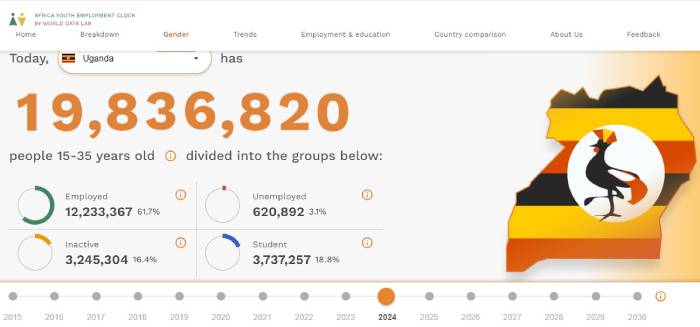Mastercard, World Data Lab unveils Africa Youth Employment Clock in Uganda
- Economy ICT
executivewatch
- November 7, 2024
- 0
- 3 minutes read

By Julius Businge
The Government of Uganda has committed to using the Africa Youth Employment Clock, a newly launched data-driven tool, to inform policies addressing youth employment.
The World Data Lab, in collaboration with the Mastercard Foundation, launched this innovative tool on Nov.7 at Kampala Serena Hotel to track youth job growth and forecast employment trends through 2030.
This initiative supports the Mastercard Foundation’s ambition to enable 30 million young Africans to secure dignified, meaningful work by 2030. Designed to democratize access to data, the Clock will guide decision-making in both public and private sectors.
Speaking at the launch (https://africayouthjobs.io/), Joyce Ssebugwawo, Uganda’s State Minister for ICT, commended the World Data Lab and Mastercard Foundation for their contributions to tackling youth unemployment, a pressing issue in Uganda.
“The government recognizes youth unemployment as a critical issue, and data-driven solutions are essential for guiding policy in sectors with potential opportunities for young people,” she said.
Ssebugwawo highlighted the government’s openness to data analytics initiatives that help identify skills gaps and align training programs with labor market demands, ensuring that young Ugandans acquire relevant skills.
By drawing on data from educational institutions, employers, and online learning platforms, the government aims to promote targeted training initiatives that meet specific industry needs, ultimately boosting youth employability according to experts.
Experts agree that data-driven insights can empower governments and other stakeholders to foster youth-led initiatives that spur job creation and economic opportunities.
Giving young people access to business intelligence tools, analytics training, and data on promising business models could drive employment growth in sectors such as digital services, agriculture, and renewable energy—industries where data reveals strong growth potential.
According to the World Data Lab, youth employment in Uganda remains largely informal and centered on agriculture.
Approximately 36% of employed individuals live in poverty, based on the international poverty line of $1.90 (purchasing power parity).
According to 2023 data (World Data Lab) Uganda has 11.5 million young workers, of whom 7.2 million (63%) are in agriculture, 1.0 million (9%) in industry, and 3.3 million (28%) in services.
Only 1.2 million (11%) are in formal employment, while the remaining 10.3 million (89%) work informally.
The Africa Youth Employment Clock is expected to be a valuable resource for Uganda’s policymakers as they strive to expand formal employment opportunities and foster economic stability for the nation’s young workforce.


